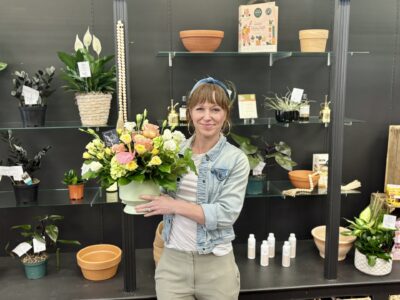Nashua’s Ikebana Flower store is closing on ‘a happy note’
If you want to know why Antoinette Drouart is closing her unusual downtown store, Ikebana Flower, after a dozen years, don’t look at the sign on the front door.
“They see it opens at 11, on the door, but don’t realize that I’ve gotten up at 5 to get everything ready,” said Drouart. “They see it closes at 6, but they don’t realize you have to stay after for hours, to prepare for a wedding.”
“To be honest, I’m a little tired,” she said.
For well over a decade Drouart, who describes herself as “of retirement age,” has been teaching the Japanese flower arranging art known as ikebana, which she learned while living in Japan. She started with night classes through Rivier University, then opened a small store on Broad Street where she began selling flowers and arrangement equipment as well as teaching. Then she moved to a bigger store on West Pearl, then in 2011 moved to 175 Main St., alongside Martha’s Exchange.
For three years her Main Street store has had one of the most unusual display windows in the city – it currently features bamboo loops holding Japanese lanterns – and has been one of the more
unusual stores, too.
“I enjoy people coming in and asking what I was. One person thought I was a massage parlor,” Drouart said. “They hear the music, feel the calm. This is an oasis. That’s what I want to create.”
She will close the store as of Dec. 31, unless a buyer steps forward. She still has hopes that somebody with knowledge will take it over.
The store will be open as usual through the holidays, including featuring a player of the traditional Japanese stringed instrument the koto during the Holiday Stroll.
Ikebana, which means “living flowers,” is an ancient Japanese practice that Drouart says goes well beyond just arranging
flowers. Teaching the art, including a specialized type of ikebana called sogetsu, has been fulfilling she says.
On retail side, Ikebana Flower sells individual flowers rather than bouquets, and they can be as unusual as kangaroo paw and the iodine plant. She avoids common flowers that don’t fit into the Japanese tradition, most notably roses, which is why unlike virtually every other flower store, Valentine’s Day is not a big time of year for her.
This specialized approach has been a business success, she says, even though she’s just around the corner from Fortin Gage Florist, a thriving Nashua institution.
“Main Street has been great,” she said of the 900-square-foot store, which she rents for $1,800 a month. Neither parking nor the much-discussed sidewalk construction has been a problem, she said, and the boost in walk-in traffic after the move from West Pearl Street was noticeable.
“Being on Main Street has brought in more young professionals,” she said. “The weekend clientele is different. More families” buying flowers when visiting somebody at city hospitals, or going to a friend’s house. That makes it worthwhile to stay open later on Saturdays.
Drouart says her income is roughly 50-50 between teaching classes, and retail, a term that also covers some corporate accounts – making displays for offices or lobbies – and events. She plans to continue some teaching and some corporate accounts, but she and husband Eric, who directs the MBA program at Assumption College in Worcester, Mass., will have more time to travel,visiting family in France and China.
“I’m leaving on a happy note,” she said. “I think I have achieved my goal of sharing my passion for flowers, culture.”
David Brooks can be reached at 594-6531 or dbrooks@nashua
telegraph.com. Also, follow Brooks on Twitter (@GraniteGeek).



